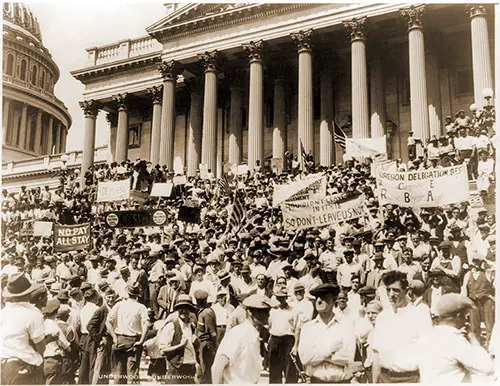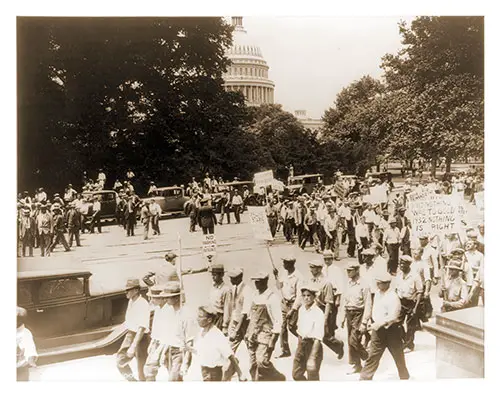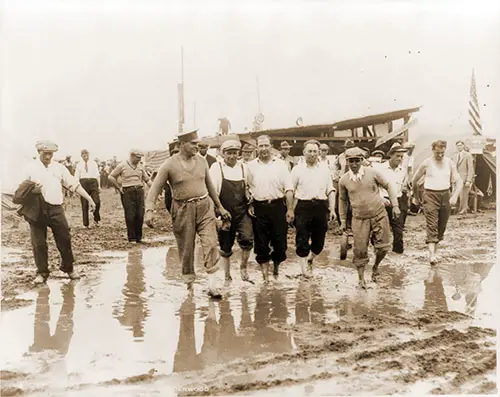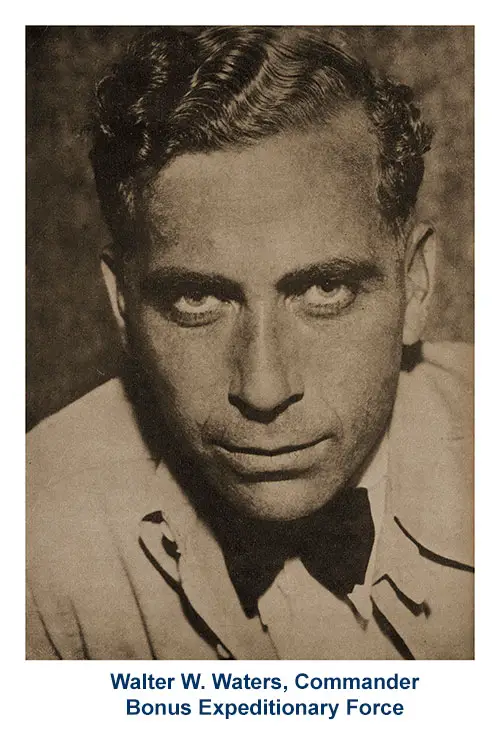Bonus Expeditionary Force - BEF - 1932

Bonus Army Stages Huge Demonstration at Empty Capitol on 2 July 1932. Photograph Shows Members of the Bonus Expeditionary Forces on the Steps of the U.S. Capitol. Unaware That Congress Had Adjourned for the Holidays, Members of the Bonus Army, Lead by Their Newly Re-Elected National Commander, Walter W. Waters, Marched to the Capitol Plaza and Staged a Monstrous Demonstration, on the Steps of the Empty Capitol. Photo Shows a Close-up of the Demonstrators and Their Banners. Photo by Underwood and Underwood, Washington. Library of Congress LC # 2016649901. GGA Image ID # 186eec060c
BEF Introduction
MANY GROUPS of citizens have marched on Washington at one time or another for various purposes but never until June and July 1932, when the "Bonus Expeditionary Forces" camped in the capital did such a movement include so many followers. Sixty thousand to eighty thousand American ex-service men in all were in that "army" at various times.
I have decided to set down the facts concerning the B.E.F. for many reasons.
The B.E.F. began as a group of men demanding the pre-payment of their adjusted service certificates voted by Congress in 1924. It soon became for a vast number of men a means of protest against the economic conditions in our country in 1932, a safety valve for dissatisfaction. It was not recognized as that at this time. It will be remembered as that in American history.
The spontaneity which marked its rise and the great popular appeal which brought twenty thousand men to Washington in the first two weeks were something new in American life.
Coming three thousand miles overland with a few hundred of these men as their leader and soon commanding thousands of them, I can tell of the motives and desires which led men to initiate the Bonus March.
Their ambitions have been seriously impugned by high official sources. It has been charged that the Bonus March was inspired, sponsored, and supported by Communists.
It has been said that the marchers intended to foment revolution and to take steps to overthrow our Government. These slurs on honest, American ex-servicemen must be corrected.
I tell this story for the sake of putting the facts about the B.E.F. on accurate record.
My position gave me an opportunity to see an amazing crosscut, a close-up view of American life, in contacts with high government officials, in daily meetings with the men in the ranks, and from thousands of letters received.
In this record I have tried to describe that view of America to the reader. It is not a class-conscious America. It is a poverty conscious America, demanding that something be done about it.
The final eviction of the B.E.F. led to one of the most disgraceful episodes in recent American history. The full truth about the steps that led to that eviction and about the event itself must be on record.
There was murder done on "Black Thursday," July 28th. The methods of eviction on that day revealed a stupidity and a cupidity among Washington politicians that is almost unbelievable.
The event itself disclosed to thousands of American citizens who had never before thought particularly about it that the men whom they elect to represent them too often forget who it was that put them in power.
This story is told with no malice or bitterness toward anyone, but I evade nothing that is necessary to the truthful recording of this chapter of recent history.
This book is not an attack on any political party. I purposely withheld publication until after the elections to prevent anyone from supposing such motives. I have refused and I shall refuse all offers to let any special group profit by my experiences. I sold out to no one. I was broke when I began the Bonus March. I was broke and in debt when I finished with it.
I do not want to include arguments for or against the immediate payment of the Bonus nor pleas for bigger and better Bonus armies. I hope that we shall never need to have another one.
Rather, here is a narrative, historically accurate, of the rise, the history and the dispersal of the B.E.F. —and nothing more.
My own background is typical of the sort of American who joined the B.E.F.
I was born in Oregon, of old American stock, in 1898 and was reared in Idaho. In 1916, restless, with no further "West" to conquer, I joined the National Guard and went to the Mexican border as a private. The regiment was later divided and one section of it was assigned to the i46th Field Artillery and sent overseas in the winter of 1917.
We entered active service at the front in July 1918. Armistice Day found us still on the firing line. After that we were ordered into Germany as a part of the Army of Occupation. We returned to the United States in June 1919, and I was honorably discharged with the rank of sergeant.
Shortly after my return to civil life my health failed. I spent several months in a hospital under the care of various physicians, for which, by the way, the Government was not asked to pay.
Then, like millions more, I attempted to take up the threads of my life where I had dropped them some three years before. Like many others of my age, I had no occupation or profession to resume. Everything had to be commenced for the first time, and it was a discouraging problem.
In the next few years I made numerous serious attempts to get going in some profitable business or position, as a garage mechanic, an automobile salesman, a farm hand, a bakery helper. Each new venture was begun with the same high enthusiasm. Each one ended as an equally dismal failure.
My inability to take root in fertile soil may have been due to the unsettling effects of the War on me. I blamed my failure on environment and felt myself daily getting more and more out of tune with my surroundings.
In 1925, I made a decision which now, in retrospect seems foolish. Eager to begin completely anew, I broke all family and personal ties and left Idaho for some chance-found place, to make a completely new start.
Telling no one of my intentions I hitch-hiked into the State of Washington and there got a job in the harvest fields. I even used a new name, "Bill Kincaid," the first name to flash into my mind when asked, as if to break the more decisively with the past. Under that name I met and married the girl who is now my wife.
During this time I made no particular effort to avoid meeting former acquaintances although I likewise made no effort to seek them out or to notify them of my whereabouts. I had dropped out of sight, in so far as family, home and former friends were concerned.
I found a job in a cannery near Portland, Oregon, worked up to be assistant superintendent and for once I seemed to have escaped from the failure that had followed me in the past.
I lost that job in December 1930, due to the depression, and went to Portland in search of employment. There I resumed my real name and later went home, for the first time in five years.
But there was no work to be found at home and, a few months later, I came back to Portland. My wife and I had a thousand dollars saved and I felt that we would get along somehow until work was obtained.
Our savings vanished and the hope of work with them during the winter of 1931-1932. In the meantime our personal belongings, one by one, found their way to the pawn shops and by March 1932, we were not only penniless but had nothing left except a very scanty wardrobe. There were many days that winter when we experienced actual hunger while earnestly trying to find any job that would provide just the necessities of life.

The Bonus Expeditionary Force Marches On Washington, 1932. Photograph by Underwood & Underwood. Library of Congress LC 2016649902. GGA Image ID # 186e55a561
In my ceaseless beating about the city I found family after family in the same general condition or worse. I saw men half clad, in threadbare clothing, pacing the streets in soleless shoes.
On their faces was the same look, part of hope, part of be wilderment, as they searched for a chance to earn a few dollars at honest work. I talked with hundreds of these men and found that, with few exceptions, they wanted not charity but work that would enable them to live and to regain their self-respect.
You, who may never have been forced through actual hunger to accept charity or even loans that are given with faint hope of repayment, do not know the double damage that poverty works. It affects the body but, worse, it wrecks self-respect.
Charity does keep the body alive after a fashion, but it reduces to a minimum any satisfaction in living; it prevents actual physical suffering but at the expense of mental torture. In time, taken in regular doses, it can have but one ending, the complete annihilation of a man's faith in himself and the complete rout of the desire that every decent man should have, to improve himself and his position in society.
I found that a large percentage of these men in Portland were, like myself, ex-servicemen. They had fought, so they had been told a few years before, "to save the nation"; they had fought, it now seemed, only in order to have a place in which to starve.
Among these men there was profound discontent with conditions. There was a ravaging desire to change them but a complete and leaden ignorance of the way to do it. Yet, among these men, hungry, desperate, downcast, there was little or no talk of the need for violent action. It was every man for himself.
One can merge one's individuality in the mass when active, even in wartime when death taps at the shoulders of men, one by one; but starving makes a man think of himself first and foremost. Yet these men were just as loyal to the nation as they had ever been.
They were just as patriotic, just as law-abiding as their more fortunate neighbors who had jobs. In other nations similar conditions might lead to revolution. Among these men the very thought, let alone the desire, was never in their minds.
These men did think and talk a great deal about the so-called Bonus. The name "Bonus" is unfortunate. It is not a gift, as that word implies.
It is a payment of money to compensate those men who served in the Army for the difference in pay between that of service men and non-service men in 1918.
The bill, asking payment in full of the adjusted compensation for wartime service, was introduced by Representative Patman of Texas and, during the early winter of 1931, was pending in Congress. The majority of veterans were hoping that it would pass.
These men had fallen far down into the valley of despair. Some push was necessary to start them out and up over the hill. Jobs would have provided the best sort of impetus but there were no jobs.
The Bonus, a lump sum of money, could act in the same fashion. Debts could be met, doctors' bills paid, a fast-fraying credit renewed, and one man could look another in the eye once more. It mattered not that the Bonus was not due, legally, until 1945.
What man, having a promise to pay at a later date would not ask his debtor for it in advance if he believed that the debtor could afford the money and if his own need was not only great but critical?
These men felt that the Government had the money. Newspapers, which can always be picked out of trash cans in the parks and public places, published stories of extensions of credit to foreign nations. Headlines told of loans to railroads and to large corporations.
This is not the place to argue the justice or the fallacy of the demand for the immediate payment of the Bonus. The point, continually forgotten, is that the Bonus in these men's minds became a substitute or a symbol for that long dreamt of new start, a job. These men had nothing to which to look forward except to the shiny shoulders of the man in front of them in the breadline.
Whenever I asked these men which they would rather have, the Bonus or a job, the reply was nearly always the same: "A job, of course. But where's a job coming from? I've looked every day for over a year and haven't found one."

Members of the Bonus Expeditionary Force Walking Through the Muddy Streets of Camp Marks in Washington, DC, 18 June 1932. Photograph by Underwood & Underwood. Library of Congress LC 2017648538. GGA Image ID # 186e68fe65
When asked what they would do with the Bonus, their answers were alike: "First, I'd buy the kids some clothes, then I'd pay the rent, then the grocery bill. And believe me, we'd have at least one good Sunday dinner." Frequently one heard, "Well, I could at least pay my debts and then maybe my credit would hold up until I do get a job."
All this could not fail to impress me because it conformed exactly to my own condition and viewpoint.
In Portland at this time there were more than eighteen hundred veterans unemployed who were the heads of families. There was an additional large number of veterans without dependents in the daily breadlines.
There were thousands of unemployed people, not veterans. But the city's charities had to care for all of them and their facilities were overtaxed. The many business and professional men in the city, who had been solicited for contributions again and again, knew it.
The hungry and unemployed veterans were not the only ones eager for the payment of the Bonus. Doctors, shopkeepers, druggists, and landlords felt that the payment of the Bonus would relieve in part the drain on public charity and would help them to collect long overdue bills. Small shopkeepers said that such a cash advance would, indirectly, keep them out of bankruptcy.
During this time I was anxiously watching reports in the newspapers of the progress of Bonus legislation. Having been originally reported for consideration in December, the bill was continually being postponed to some future date. Posts of the American Legion all over the country were going on record in favor of immediate payment, thus reversing the attitude which their delegates, at President Hoover's request, had expressed in the National convention the previous autumn.
The rank and file in the Legion were voting now, and not the leaders and the few delegates. The Veterans of Foreign Wars had been carrying on an aggressive campaign to secure signatures on petitions to be presented to Congress. I noticed, too, that the highly organized lobbies in Washington for special industries were producing results; loans were being granted to their special interests and these lobbies seemed to justify their existence. Personal lobbying paid, regardless of the justice or injustice of the demand.
Then, too, I knew that the Adjusted Service Certificates, the "Bonus," maturing in 1945, would in reality bring a very small sum of money to their holders at that date. Most of the veterans had applied for part payment under the law of 1931.
(Incidentally, I had not applied prior to 1931 for at that time I did not need it. When I did apply, I was told that I would have to wait two years, until I933.)
This part payment was in reality a loan, and the interest charged would consume almost all the balance remaining by 1945, giving the veteran at that date only a few dollars.
A veteran entitled to $1500, for instance, who applied for and received half of that amount in 1931, would have coming to him less than a hundred dollars in 1945, unless he made repayment of the principal prior to that date.
My interest in all this was not inspired through pure curiosity or altruistic benevolence. I was broke and was unable to pay the rent on the two small rooms we were occupying in one of the poorer sections of the city.
The man who managed the building was a veteran and only his kindness and sympathy prevented our being moved out on the street. For food we were forced to depend solely on friends or on the municipal charity organizations.
Yet, in my pocket was an obligation of the Government promising to pay me at a later date a sum of money. Now, perhaps, it is clear why I and a hundred thousand more wanted that money if it could possibly be secured.
Here, then, is the origin of the Bonus Expeditionary Force.
Early in March 1932, I had come to the conclusion that Congress was purposely playing football with the Bonus bill and had no intention of giving it favorable consideration regardless of the demand which ex-service men were voicing through the various veterans' organizations.
I knew that during 1931 and again during the recent months there had been pilgrimages to Washington by freight train, of small groups of ex-service men. I had heard of Coxey's Army, but I had never heard that it had gotten anything; its demands were too vague.
A small Bonus March had gone to Washington from Portland in 1931. I had also read the Constitution of the United States which grants the right to American citizens to assemble and to petition Congress peacefully for a redress of grievances.
Gradually the determination to go to Washington to lobby for the Bonus bill grew on me. The more I thought about it, the more it appealed. Other lobbies had moved to Washington, supported by money. We had no money, but perhaps a group, whose only support was in its numbers, might go to Congress and make some impression.
I wanted to speak about this to some veterans' organization and urge its members to support such a march. Not being a member of any such group at the time I had to find some way to present my ideas.
I asked a member of the Portland assembly of the National Veterans' Association to secure permission for me to address it. He told me I might come to the meeting on March 15th.
This was to be my first speech before an organized body and I wrote it out and memorized it while pacing around the block at night, sometimes until dawn.
Feeling all the sensations of stage fright, I told the several hundred veterans present that the tactics now being employed to bring about the payment of the Bonus would fail. "Writing letters to Congressmen," "signing petitions," —all these provided things which could be tucked away in a desk drawer and most conveniently forgotten.
But several hundred men at the capital —I foresaw no greater number—might be more difficult to forget. Our only hope was in following the successful tactics of Big Business; when its representatives wanted something from Congress, they went to it personally and said so. No tariff schedule was ever raised merely by having Pennsylvania manufacturers write letters to say they would like it so.
The audience was interested, up to a point. I admitted that the only way to get to Washington was by freight train but added that the weather would soon be warm and that such a trip would not be overly difficult. I closed by saying that if not fewer than three hundred men were willing to organize under strict military discipline, we could probably attract a few hundred more men en route and have perhaps a thousand men in Washington.
My speech fell flat. The opinion prevailing then was that the Bonus bill would be voted on in a few weeks without any further lobbying. Discouraged at this response, I resumed my search for work. I did not forget my hope of going to Washington, but I sought no further chances to make speeches.
At the end of April I noticed in the newspaper a statement that a meeting of unemployed ex-servicemen was to be held outdoors, to organize a march to Washington.
At the meeting there were a hundred veterans. I was asked to speak. The leader was George Alman, a soft-spoken lumberjack from the northwest woods, who had grown tired of standing in breadlines and who had attended the meeting which I addressed during the previous month.
The same lack of enthusiasm marked the crowd. Another meeting was called for the next day. After all, meetings in the Plaza provided a break in the monotony of searching, hopelessly, for work.
I repeated at this next meeting what I had said in March. More gatherings followed and very slowly there was a distinct increase in enthusiasm. More and more veterans showed their willingness to make the journey, even though they believed it eventually futile. After all, there was little difference between hunger in Washington and hunger in Portland.
Every man who addressed the slowly increasing crowds made it clear that such a march must be marked by proper organization, discipline and obedience to law and order, both en route and while in Washington.
Then, in early May, the Bonus bill was shelved "for good" by the Ways and Means Committee of the House of Representatives.
It was this which brought the nucleus of the B.E.F. from an idea into a reality.
The crowds started to increase at the daily meetings. Men signed up by the dozens and plans to get started were under way. From the beginning, and to the end, every man who wanted to join had to show evidence of his war service.
Each man had to declare "to uphold the Constitution of the United States to the best of my ability and swear an unswerving allegiance to its flag." Each man had to agree to be law-abiding and to submit to proper discipline as administered by elected officers.

Walter W. Waters, Commander of the Bonus Expeditionary Force, circa 1931. GGA Image ID # 186ec09b87
A final meeting was held on May 10th. A "Commander-in-Chief" was chosen who was to travel ahead by automobile, arranging for food and transportation. A "Field Marshal" with his assistants was appointed. The men were divided into companies of forty each, in charge of a "Captain" who, in turn, appointed his "Lieutenants" and "Sergeants."
I held the rank of "Assistant Field Marshal." Our little army, at the final roll call, numbered two hundred and fifty men. After a few days en route it increased to nearly three hundred.
Thus the first group of the B.E.F. arose.
WALTER W. WATERS,
Commander, B.E.F.
Walter W. Waters, William C. White, “introduction,” in B.E.F. The Whole Story of The Bonus Army, New York: The John Day Company, 1933.
